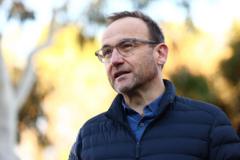**With rising concerns over U.S.-Australia relations and domestic issues at stake, candidates are grappling with how to position themselves amid international uncertainty.**
**Trump's Influence Casts Long Shadow Over Australia's Federal Election**

**Trump's Influence Casts Long Shadow Over Australia's Federal Election**
**As Australia gears up for its federal election, the specter of Trump and his global trade policies weighs heavily on political dynamics.**
In a unique blend of culture and politics, the excitement of rodeo in Western Sydney mirrors the unpredictability of Australia’s political landscape as the country prepares for its federal election on May 3. Amid cheers and the sounds of clanging spurs, the festive atmosphere and cowboys in Stetsons reveal an outback tradition meshing with global concerns. However, as politicians embark on their campaigns, the looming figure of Donald Trump influences their strategies profoundly.
As Donald Trump navigates the second term of his presidency, his controversial tariffs have reverberated across the globe, stirring unease in Australia. Unlike 2016, when his election sparked limited concern, the unpredictable nature of his policies now compels Australian leaders to reassess their relationship with the U.S. Amidst a changing international narrative, locals at the rodeo express mixed feelings about American policy - with some heralding Trump's leadership while others remain skeptical of its implications.
Australian Prime Minister Anthony Albanese has openly criticized Trump’s tariffs, stating they do not reflect the values of friendship and cooperation. This is particularly pivotal as the nation’s leaders grapple with urgent issues closer to home, such as rising living costs and healthcare, while simultaneously addressing external pressures from a tumultuous U.S. presidency.
As the federal election approaches, polls indicate a strengthening position for the Labor Party, aiming to solidify its stance in an increasingly complex political climate. Analysts suggest that the uncertainty created by Trump may inadvertently bolster Albanese's re-election prospects, drawing parallels to recent Canadian elections where incumbents benefited from anti-Trump sentiment.
Amidst these fluctuating political tides, Australian leaders are tasked with navigating their foreign policy while maintaining their alliances, particularly in light of China's escalating influence in the Pacific region. This delicate balancing act remains evident in public sentiment, with many Australians expressing increasing distrust toward the U.S. in recent polls.
As the rodeo winds down and anticipation builds for the election outcome, the question looms: how will Australia reconcile its values and international relations in an era defined by unpredictability? The upcoming elections demand decisive leadership as candidates strive to align their policies with an electorate wary of global anxieties and eager for stable governance.
As Donald Trump navigates the second term of his presidency, his controversial tariffs have reverberated across the globe, stirring unease in Australia. Unlike 2016, when his election sparked limited concern, the unpredictable nature of his policies now compels Australian leaders to reassess their relationship with the U.S. Amidst a changing international narrative, locals at the rodeo express mixed feelings about American policy - with some heralding Trump's leadership while others remain skeptical of its implications.
Australian Prime Minister Anthony Albanese has openly criticized Trump’s tariffs, stating they do not reflect the values of friendship and cooperation. This is particularly pivotal as the nation’s leaders grapple with urgent issues closer to home, such as rising living costs and healthcare, while simultaneously addressing external pressures from a tumultuous U.S. presidency.
As the federal election approaches, polls indicate a strengthening position for the Labor Party, aiming to solidify its stance in an increasingly complex political climate. Analysts suggest that the uncertainty created by Trump may inadvertently bolster Albanese's re-election prospects, drawing parallels to recent Canadian elections where incumbents benefited from anti-Trump sentiment.
Amidst these fluctuating political tides, Australian leaders are tasked with navigating their foreign policy while maintaining their alliances, particularly in light of China's escalating influence in the Pacific region. This delicate balancing act remains evident in public sentiment, with many Australians expressing increasing distrust toward the U.S. in recent polls.
As the rodeo winds down and anticipation builds for the election outcome, the question looms: how will Australia reconcile its values and international relations in an era defined by unpredictability? The upcoming elections demand decisive leadership as candidates strive to align their policies with an electorate wary of global anxieties and eager for stable governance.






















